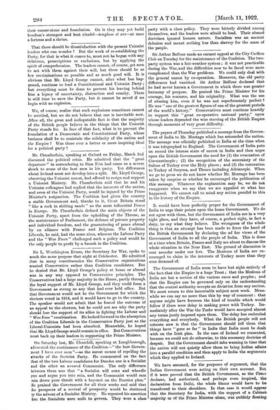Sir L. Worthington Evans, the Secretary for War, spoke to
much the same purpose that night at Colchester. He admitted that in many constituencies the Conservative organizations wanted Conservative rather than Coalition candidates. But he denied that Mr. Lloyd George's policy at home or abroad was in any way opposed to Conservative principles. The Conservatives had a large majority in the House, partly through the loyal support of Mr. Lloyd George, and they could form a Government as strong as any that had ever held office. But that Government would not be the Government for which the electors voted in 1918, and it would have to go to the country. The speaker would not admit that he feared the outcome of an appeal to the electors, but he could not see why the party should lose the support of its allies in fighting the Labour and "Wee Free" combination. He looked forward to the absorption of the Coalition Liberals in the Conservative Party just as the Liberal-Unionists had been absorbed. Meanwhile, he hoped that Mr. Lloyd George would remain in office. But Conservatives mat back up their leaders, in supporting the Prime Minister.


































 Previous page
Previous page